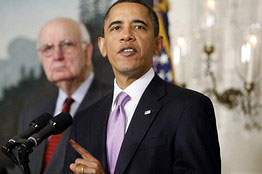 Paul Volcker has been championing stricter bank regulation for months now — and seemingly getting nowhere against the combined forces of Larry Summers and Tim Geithner. But I guess a 6′ 7″ former Fed chairman can still wield some clout after all. Today, with Volcker at his side, Barack Obama announced his new proposal to limit bank size and risk:
Paul Volcker has been championing stricter bank regulation for months now — and seemingly getting nowhere against the combined forces of Larry Summers and Tim Geithner. But I guess a 6′ 7″ former Fed chairman can still wield some clout after all. Today, with Volcker at his side, Barack Obama announced his new proposal to limit bank size and risk:
“My resolve to reform the system is only strengthened when I see a return to old practices at some of the very firms fighting reform; and when I see record profits at some of the very firms claiming that they cannot lend more to small business, cannot keep credit card rates low, and cannot refund taxpayers for the bailout,” President Obama said Thursday. “It is exactly this kind of irresponsibility that makes clear reform is necessary.”
Admistration officials said the new rules would force major institutions from J.P. Morgan Chase to Bank of America to decide the direction of their business. Banks shielded from risk through federal-deposit insurance, or aided in financial crises by low-interest loans from the Federal Reserve Board, would no longer be allowed to engage in trading unrelated to their customers’ interests, one senior administration official said.
Just how tough will these new rules be? We don’t know yet, since Obama offered no detail at his press conference. However, Tyler Cowen offers a list of things to watch for:
- Do its restrictions apply to subsidaries, affiliates, and holding companies in a meaningful way? Can they apply?
- How do the restrictions apply to off-balance sheet activities, if at all? Keep in mind the various lessons about the construction of synthetic asset positions.
- How will Congressional oversight committees apply and interpret the plan? This is a big one.
- Can a financial institution avoid or sidestep the restrictions by changing its status as a commercial bank, legally speaking?
- If you cap bank size, are the new and smaller banks still “too big to fail” by prevailing standards?
- How does the proposal treat bank leverage, including implicit forms of leverage through off-balance sheet activities? Does leverage get redistributed elsewhere?
- How does it affect the political economy of bank lobbying?
“I don’t pretend to know the answers to these questions,” Tyler says, “nor do I expect such answers to be announced on day one.” Me neither. But as we get them we’ll begin to know whether this is a serious proposal or just a PR move.















